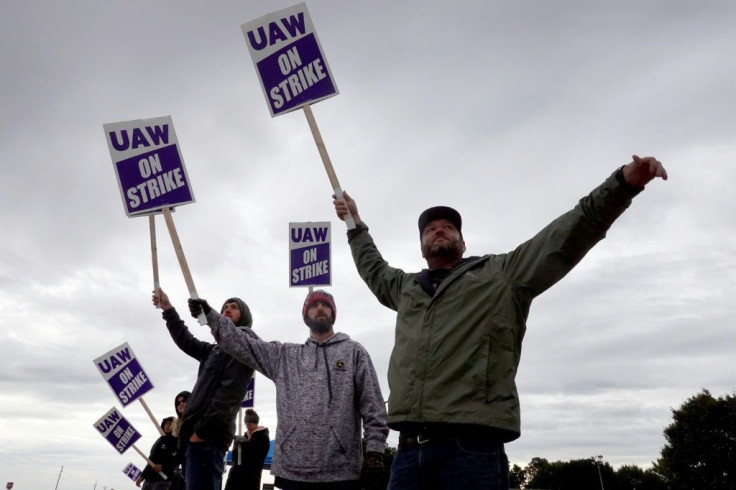Frustrated And Weary Over Pandemic Slog, More US Workers Are Striking
Exhausted after working long hours during the coronavirus pandemic and resentful that their bosses are not sharing sometimes huge profits, tens of thousands of nurses, factory workers and other laborers are going on strike across the United States.
Some 31,000 employees of the Kaiser Permanente healthcare group in the western states of California and Oregon are poised to strike soon.
Since Thursday, 10,000 employees of the John Deere farm equipment company have been on strike, while 1,400 workers walked off the job at the Kellogg's cereal company on October 5. And more than 2,000 employees of Mercy Hospital in Buffalo, New York, began striking October 1.
In Hollywood a planned strike by tens of thousands of cinematographers, hairdressers, makeup artists, sound editors and other film crew members that threatened to paralyze the US movie industry from Monday was narrowly averted over the weekend when the union reached a tentative three-year deal with producers.
But despite the Tinseltown agreement, the sudden rash of strikes this month has been so pronounced as to lead some to coin the word "Striketober," a neologism since embraced on social media even by prominent progressive Democratic congresswoman Alexandria Ocasio-Cortez.
During the pandemic, workers say, they often had to bear extra burdens to make up for others who were staying home.
"We've sacrificed our time with our families, we missed ballgames with our kids and dinners and weddings, in order to keep boxes of cereal on the shelves," said Dan Osborn, a mechanic at Kellogg's for 18 years.
"And this is how we're getting repaid," he continued, "by asking us to take concessions at a time when the CEO and executives have taken increases in their compensation."
Osborn, the president of a local chapter of the Bakery, Confectionery, Tobacco Workers and Grain Millers union (BCTGM), said workers object to a two-tier pay system that leaves some newer employees making far less than older workers.
"We are not asking for anything as far as increases in our wages and benefits," he said. Nor are workers opposing long hours.
But they do reject a pay system that leaves some employees earning less for the same work, and to a revocation of inflation-linked pay raises -- particularly at a time when prices have been surging.
"The strike can go however long it takes," Osborn said. "All we have to do is hold out one day longer than the company."
Most of the strikes are motivated by demands for better working conditions, said Kate Bronfenbrenner, who specializes in union and labor issues at Cornell University in New York.

"Companies are making more profits than ever, and workers are being pushed to work harder than ever, sometimes risking their lives to go back to work in the context of Covid," she said.
So when employers refuse to compromise, Bronfenbrenner added, "workers are less willing to ratify contracts they feel don't meet their needs."
The exact number of strikes now under way is difficult to know, as the US government keeps track only of those affecting more than 1,000 employees.
But the movement has grown since a high-profile 2018 strike by West Virginia teachers, said Josh Murray, a sociology professor at Vanderbilt University in Tennessee.
Unhappy with the contract negotiated by their union, those teachers went on strike -- and were rewarded with a five-percent pay raise.
The result: a contagion of work stoppages.
"The more strikes that are successful, the more strikes follow, because workers start to believe they can actually win something and are willing to take the risk of not getting paid, of losing their job," Murray said.
The Kellogg's strike followed another job action in July by 600 workers at a Frito-Lay snack food factory in Kansas. Frito-Lay is a subsidiary of PepsiCo.
That 19-day strike resulted in a guarantee of weekly time off, as well as pay raises.
And after a five-week strike by 1,000 employees of the Nabisco snack corporation -- a subsidiary of profitable giant Mondelez International -- the company dropped plans for a two-tier pay plan.
For many workers, the pandemic has been an empowering time.
"Some workers started seeing that, 'Oh, wow, we're actually essential, the economy shuts down without us,'" Murray said.
Unions have also profited in recent years from the rise in social movements with similar interests -- as when an Arizona hotel workers union allied itself to immigrant groups.
But Murray does not expect companies to give in easily.
"Eventually there will be backlash," he said. "Corporations aren't in the business of giving away or letting labor costs rise."
But the current dynamic reflects one economists and sociologists have seen over time, Murray said: "The tighter the labor market, the more powerful labor is, the more likely there are to be strikes."
© Copyright AFP 2024. All rights reserved.





















